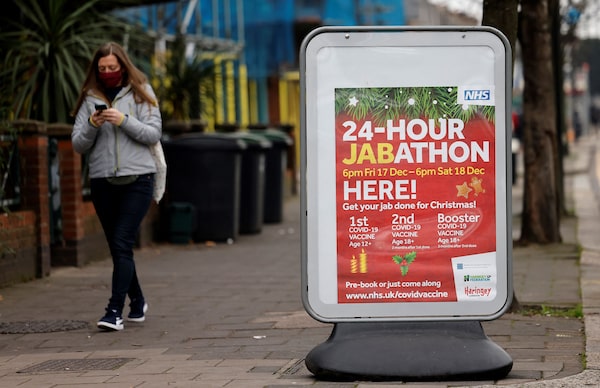
A pedestrian walks past a sign for a 24-hour vaccination centre, in London, on Dec.18.TOLGA AKMEN/AFP/Getty Images
British Prime Minister Boris Johnson said on Monday he would tighten coronavirus curbs to slow the spread of the Omicron variant if needed, after the Netherlands began a fourth lockdown and as other European countries consider Christmas restrictions.
Speaking after media reported Britain might impose new curbs after Christmas, Mr. Johnson said the situation was “extremely difficult” and hospitalizations were rising steeply in London.
“I have to say to the British public, and I say to everybody, we will not exclude the possibility of going further if we have to do things to protect the public,” Mr. Johnson said after a cabinet meeting.
Omicron infections are multiplying rapidly across Europe and the United States, doubling every two or three days in London and elsewhere and taking a heavy toll on financial markets, which fear the impact on the global economic recovery.
The variant was first detected last month in southern Africa and Hong Kong. It has, so far, been reported in at least 89 countries.
The severity of illnesses that Omicron causes remains unclear.
Any limits on Christmas celebrations would come at a high political cost for Mr. Johnson, already under fire over reports he and his staff broke lockdown rules last year.
Asked about speculation the government would ban indoor socializing and limit tourism, Mr. Johnson said: “We’re looking at all kinds of things … we will rule nothing out.”
Dutch Prime Minister Mark Rutte announced a shutdown on Saturday, ordering the closing of all but essential stores, as well as restaurants, hairdressers, gyms, museums and other public places until at least Jan. 14.
Germany plans to limit private gatherings from Dec. 28 to a maximum of 10 people who have been vaccinated or recovered from COVID-19, according to a draft of proposed steps. The document also said access to restaurants would remain limited to people who could provide proof of vaccination or recovery.
Ireland on Friday ordered bars and restaurants to close at 8 p.m. and reduced the capacity in all public events. Italy is also considering new measures, newspapers reported on Sunday.
Coronavirus cases surged in New York and around the U.S. over the weekend, dashing hopes for a more normal holiday season and stretching the country’s testing infrastructure just days before Christmas.
In Washington, Mayor Muriel Bowser said the city would reinstate an indoor mask mandate beginning Tuesday and running until the morning of Jan. 31. All employees, contractors and grantees of the District of Columbia government must be fully vaccinated against COVID-19 and have a booster shot, she said.
In Geneva, World Health Organization (WHO) chief Tedros Adhanom Ghebreyesus said Omicron is spreading faster than the Delta variant and causing infections in people already vaccinated or who have recovered from COVID-19.
China, where the SARS-CoV-2 coronavirus was first detected in late 2019, must be more forthcoming with information about its origin, Mr. Tedros said. “We need to continue until we know the origins. We need to push harder because we should learn from what happened this time in order to [do] better in the future.”
WHO chief scientist Soumya Swaminathan said it was too early to conclude Omicron is milder than prior versions of the virus, adding that it could still make enough people sick to “overburden” health care systems.
Many monoclonal drugs “will not work with Omicron,” she said of the infused treatment used to lessen disease severity of COVID-19 patients.
Monoclonal antibody drugs deliver lab-made versions of the body’s natural antibodies to fight infection, while vaccines spur the body to make its own antibodies and build its own immunity.
Israel added Canada and the U.S. to its “no-fly” list, citing concerns over the Omicron variant. U.S. infectious-diseases expert Anthony Fauci said Omicron was “raging through the world” as he urged Americans to get booster shots.
Booster shots, on top of two-shot vaccinations, appear critical to fighting the variant. Moderna Inc. said a booster dose of its vaccine seemed to be protective against Omicron in laboratory testing, and the current version of the shot would remain Moderna’s “first line of defence.”
More than 274 million people have been reported to be infected by the coronavirus globally since the pandemic began. More than 5.65 million people have died.
Sign up for the Coronavirus Update newsletter to read the day’s essential coronavirus news, features and explainers written by Globe reporters and editors.